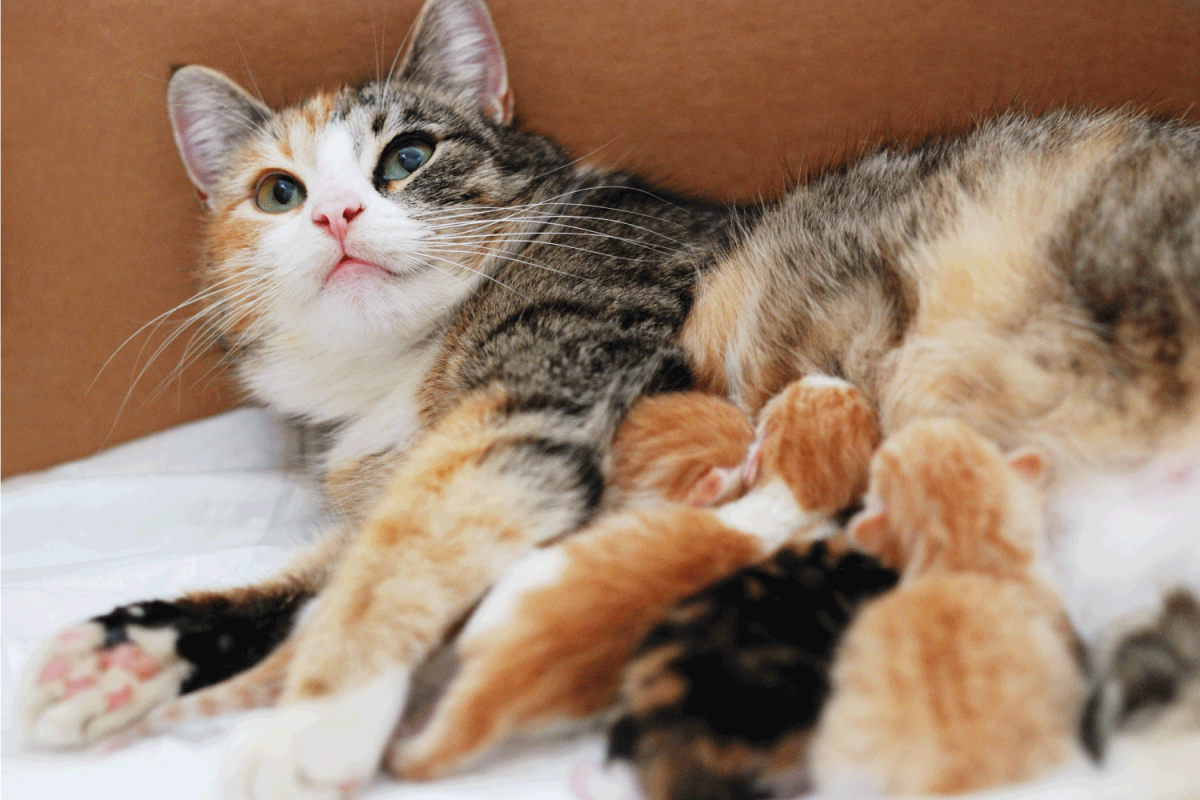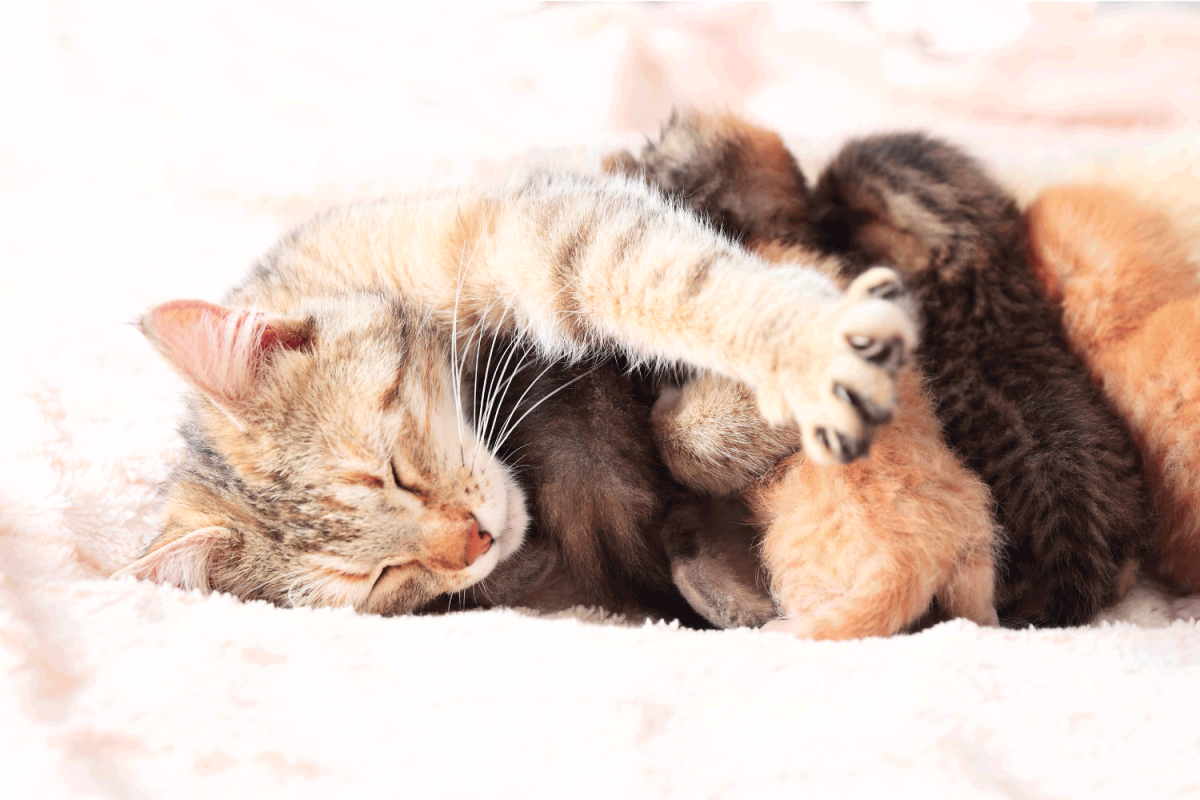Have you ever thought about having a litter of cute, fluffy kittens from your beloved feline friend? It's a tempting thought, isn't it? But, before you start planning your cat's breeding career, there's something important you need to consider - cat overpopulation.
With so many cats already in the world, it's crucial that we do our part to control the population and give each and every one of them the love and attention they deserve. And, the solution is simple - spaying or neutering your cat.
In this article, we'll dive into the topic of cat breeding and the reasons why spaying or neutering your furry friend is the best option. Whether you're a cat parent or just a cat lover, you won't want to miss this. So, grab a cup of coffee, settle in, and let's talk about why it's so important to spay or neuter your cat.
And in case you're still not sure, the answer to the question "How many Litters Should You Let Your Cat Have" is ZERO.

Why You Should Not Let Your Cat Get Pregnant
As a responsible cat owner, it's your job to ensure the health and well-being of your furry friend. Allowing your cat to get pregnant may seem like a fun idea, but the reality is far from it. Here are three compelling reasons why you should never let your cat get pregnant.
#1 Pregnancy Carries Health Risks for the Cat
Cats are not immune to pregnancy complications, and in fact, some cats are more prone to them than others.
Pregnancy can put a lot of strain on a cat's body, and if left unchecked, it can lead to serious health problems.
Some common complications include eclampsia (also known as milk fever), pyometra (infection of the uterus), and even death.
To ensure the health and well-being of your cat, it's best to avoid pregnancy altogether.
#2 Pregnancy and Birth are Expensive to Manage
Bringing a litter of kittens into the world is no cheap feat. From prenatal care to delivery and post-partum care, you'll need to invest a lot of time, effort, and money into your cat's pregnancy.
This is not to mention the cost of feeding, housing, and caring for the kittens once they're born.
If you're not prepared for the financial commitment, it's best to avoid breeding your cat.
#3 It's Very Hard to Find Good Homes for Kittens
Finding good homes for kittens can be a real challenge, especially if you're not familiar with the process.
Not everyone is willing or able to take on the responsibility of a new pet, and if you're unable to find homes for your kittens, you may end up with a house full of cats.
This not only puts a strain on your resources, but it also takes away homes from other kittens who may end up being euthanized in shelters.
Is It Dangerous For A Cat To Have Too Many Litters?
Even a single litter can put a cat's life and well-being at risk. Pregnancy and childbirth put a tremendous amount of strain on a cat's body, and if left unchecked, it can lead to serious health problems.
Over time, having multiple litters can lead to a decline in the overall health and well-being of the cat, as they become worn out from the repeated strain of pregnancy and childbirth.
Some of the common health problems associated with repeated litters of kittens include reproductive tract diseases and infections, as well as a decreased lifespan.
In severe cases, repeated litters can even lead to death. So, if you're a responsible cat owner, it's important to take steps to prevent your cat from having too many litters.
The best way to do this is to spay or neuter your cat, which will not only prevent unwanted litters, but will also ensure the health and well-being of your furry friend for years to come.

Breeding Purebred Cats - Is it Right or Wrong?
The issue of cat breeding is a contentious one, and opinions vary greatly on the matter. While some people believe that all breeding of cats is wrong, others believe that it's okay for experienced and ethical breeders to breed purebred cats.
It's important to note that just because someone has a purebred female cat, it doesn't mean that they can simply find a purebred male of the same breed and let the pair breed.
Breeding purebred cats is a complex and regulated process and requires a great deal of expertise. Ethical breeders must follow strict guidelines and regulations to ensure the health, well-being, and genetic diversity of their breeding cats.
Breeding without proper knowledge and expertise can result in negative outcomes for the cats, including health problems and genetic issues. It's also known as Backyard Breeding. Not something that you want to be called.
What does it take to be an ethical cat breeder?
Ethical breeders must follow strict rules and guidelines to ensure the health, well-being, and genetic diversity of their breeding cats.
For instance, ethical breeders must keep detailed records of their breeding cats and their offspring, and they must also invest in genetic testing to ensure that they're not passing on any harmful traits or diseases.
Additionally, breeding cats must be well taken care of and receive regular veterinary care to ensure that they're in good health.
It's important to note that cat breeding is not for amateurs. It's an expensive and time-consuming process that requires a lot of knowledge and expertise.
If you're considering breeding your purebred cat, it's crucial that you do your research and make sure that you're prepared for the commitment.
At What Age Can A Cat Get Pregnant?
Female cats reach sexual maturity at an early age. They can get pregnant even when they are as young as 4 months old, although the average age is around 6 months old.
This is the time when they reach their puberty stage and experience their first heat cycle. Cats do not bleed during this period, but you'll be able to observe some behavioral changes throughout the cycle.
They can be more demanding of your attention, become more affectionate or start rubbing themselves on you or your furniture. Their cycle usually lasts between 4 and 7 days, but it can vary from one female to another. Some may experience it only for a day while some go into heat for as long as 3 weeks.
If by any chance the female feline mates with a male, then there's a probability that breeding may happen. That's why if you don't want your pet to get pregnant, you should have her spayed when she's around 4 to 6 months old to prevent unwanted pregnancies.
What Age Does A Cat Stop Having Kittens?
Cats do not go through menopause. This means that they can get pregnant and produce litter during their entire life unless they're spayed, of course.
This is why spaying is very important. You don't just avoid unwanted (and a lot of) pregnancies but most importantly, you are able to protect your female cat from diseases such as breast tumors and uterine infections.
How Many Kittens Are In A Litter?

The average number of kittens in a litter is four, but in reality, there can be anywhere from 1 to 12 kittens in each litter.
When a female cat gives birth for the first time, you can expect a small litter size.
However, some breeds are more prone to produce a larger number of offspring such as the Siamese, Oriental, and Burmese cat breeds. A Burmese/Siamese queen holds the record for having the world's largest litter at 19 kittens.
How Many Kittens Usually Survive In A Litter?
As mentioned earlier, there is an average of 4 kittens in a litter. Studies show that about 70 to 85 percent of them will survive.
Some newborn kittens are stillborn while some die during the first few weeks of their lives due to trauma, birth defects, nutritional problems, infections, and other health issues.
But then again, it will depend on the health of the mother cats and how they are able to care for their young. That's why pet parents should give them the best possible care and support all throughout their pregnancy and after giving birth. Regular checkups with the veterinarian are recommended.
Back to the number of litters a cat should be allowed to have
As we've discussed, there are many reasons why it's important to spay or neuter your cat, and why the number of litters a cat should have is zero.
Pregnancy carries health risks for the cat, and it's expensive and time-consuming to manage. Additionally, it's very hard to find good homes for kittens, and even if you do, that's at the expense of other kittens who may end up being euthanized in shelters.
Furthermore, it's important to note that even if someone has a purebred female cat, they can't simply look for a purebred male of the same breed and let the pair breed. Breeding purebred cats is a complex and regulated process that requires a great deal of knowledge and expertise, and it's crucial to make sure that you're fully prepared for the commitment.
So, unless you happen to be an ethical breeder (in which case, you won't be asking this question!) the number of litters a cat should have is zero.
Spaying your cat is the best way to ensure her health and well-being, as well as the health and well-being of the wider cat population. So, if you're a responsible cat owner, make the choice to spay or neuter your furry friend today.
Some elements on this page may have been created by our team using advanced AI to provide you with top-notch cat inspired ideas. Read more about our AI Content Policy.
